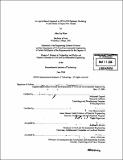An agent-based approach to HIV/AIDS epidemic modeling : a case study of Papua New Guinea
Author(s)
Rhee, Alisa Joy
DownloadFull printable version (6.423Mb)
Alternative title
Agent-based approach to Human T-lymphotropic virus/Acquired immune deficiency syndrome epidemic modeling : a case study of Papua New Guinea
Other Contributors
Massachusetts Institute of Technology. Dept. of Civil and Environmental Engineering.
Advisor
Nathaniel Osgood and Fred Moavenzadeh.
Terms of use
Metadata
Show full item recordAbstract
Since AIDS was first discovered, mathematical models of the transmission dynamics of HIV have been developed to determine the drivers of the epidemic. It has become apparent that the most profound factor in the proliferation of this disease is the aggregate effects of individual behavior and perception of risk. Agent-based models (ABM) allow one to simulate the social and sexual interactions which may describe the societal context in which HIV may spread. Using this framework, I construct a simplified social and sexual network that represents Papua New Guinea. This country is used as a case study because it illustrates extremes in network topology. Papua New Guinea is characterized by geographic isolation of ethnic groups, such that ideas of behavior change, stigma reduction, and safe sex practices may spread very slowly. Furthermore, sexual networks in Papua New Guinea are complex and sexual violence and cultural practices may amplify the rate at which HIV is spread. Ultimately, the purpose of HIV transmission models is to hypothesize about drivers of the epidemic which will then shed light on appropriate interventions and prevention measures. ABMs facilitate the development of network-based public health interventions. Such interventions, like home-based care programs, may have great promise in Papua New Guinea.
Description
Thesis (S.M.)--Massachusetts Institute of Technology, Engineering Systems Division, Technology and Policy Program; and, (S.M.)--Massachusetts Institute of Technology, Dept. of Civil and Environmental Engineering, 2006. Includes bibliographical references (p. 91-95).
Date issued
2006Department
Massachusetts Institute of Technology. Department of Civil and Environmental Engineering; Massachusetts Institute of Technology. Engineering Systems Division; Technology and Policy ProgramPublisher
Massachusetts Institute of Technology
Keywords
Technology and Policy Program., Civil and Environmental Engineering.